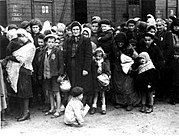
The location of Hotel Polski in Warsaw.
| Part of a series on | ||||||||||
| The Holocaust | ||||||||||
|---|---|---|---|---|---|---|---|---|---|---|
 |
||||||||||
|
||||||||||
|
||||||||||
|
Atrocities
|
||||||||||
|
Camps
|
||||||||||
|
Remembrance
|
||||||||||
Hotel Polski (Polish Hotel), opened in 1808, was a hotel in Warsaw, Poland, at 29 Długa street. In 1943, the Hotel was used by Germans as an internment place for Jews from Warsaw, where they could buy foreign affidavits and passports and, as foreign citizens, leave Warsaw. This case is known as "Hotel Polski Affair".
In 1942, the Germans, helped by Jewish collaborators from the Żagiew network, promised to allow Jews from Warsaw holding foreign passports of neutral countries to leave the General Government for South America. Seeing this as an opportunity to save the lives of Jews in the ghettos, Jewish organizations from Switzerland started sending documents to the Warsaw Ghetto. However, in many cases, the holders of these affidavits and passports were already dead. In May 1943, after the last deportation from the Warsaw Ghetto, a network of Jewish collaborators, some of them probably in direct agreement with local Gestapo authorities, started to sell these documents to Jews who were hiding on the "Aryan" side of Warsaw. The Gestapo used the Hotel Polski to house the Jewish families preparing for the journey. Around 2500 people came out of their hiding places and moved to the Hotel Polski. In July 1943 they were transferred to the Vittel and Bergen-Belsen camps. On 15 July 1943, the 300 Jews remaining in the Hotel without foreign passports were executed by the Germans at Pawiak prison. The South American governments refused to recognize most of the passports. Therefore, instead of being transferred to South America, the Jews were sent to Auschwitz in October 1943 and May 1943. About 350 Jews who held Palestinian affidavits survived.
Some of the famous residents of Hotel Polski included Itzhak Katzenelson, a famous poet, as well as Menachem Kirszenbaum and Jehoszua Perle from the Jewish resistance.
Many historians see the "Hotel Polski affair" as a German trap to lure the richer Jews out of their hiding places in Warsaw under false promises and steal their possessions. However, as new Polish research points out, if the South American governments had recognized these passports, this would have been a real chance of survival for some Warsaw Jews.[citation needed]
References[]
- Hotel Polski at yadvashem.org
Further reading[]
- Agnieszka Haska, Jestem Żydem, chcę wejść. Hotel Polski w Warszawie, 1943, Instytut Filozofii i Socjologii PAN, 2006, ISBN 83-7388-096-8. (Polish)
- Shulman, Abraham (1982). The Case of Hotel Polski. An Account of One of the Most Enigmatic Episodes of World War II. New York: Schocken. ISBN 0896040348.
Coordinates: 52°14′48″N 21°0′17″E / 52.24667°N 21.00472°E
The original article can be found at Hotel Polski and the edit history here.